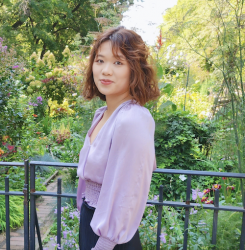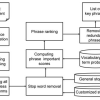Our Researcher Spotlight Series profiles DataLab affiliated faculty, staff, graduate students and postdoctoral scholars across disciplines to demonstrate the diversity of our community and highlight their amazing work.

Andrea Yang is an English PhD student at Davis and DataLab’s Digital Humanities Intern. As an undergraduate, she studied both English and Computer Science: “two majors that had nothing to do with each other,” according to most people she talked to who were confused by her future career path. Fully prepared to leave behind her literary background, she pursued a Master’s in Computer Science: but the experience exposed her to text mining and digital humanities and instead set her on a path to unite her two passions via her work as a digital humanities and early modern literary scholar here at Davis.
Despite her research focus centering the literature of the 16th and 17th centuries, Andrea initially joined DataLab to work on British Romantic Women Poets, a database project housing a manuscript archive of 19th-century women writers held in Shields Library’s Special Collections. The manuscripts had initially been encoded under the now out-of-date TEI 2 standard, and she worked as a programmer and encoder alongside a local high school intern to update the XML files to match the current P5 standard and prepare the project to be transferred to a new host site. “My work entailed identifying elements to the original encoding no longer supported by P5, and then writing code to programmatically update them across the archive,” she explains.
I really believe digital methods can not only help us become better readers and expand the possibilities of research questions, but [they can also] help us reflect on the discipline itself and where to go from where we are.
As an early modernist studying the works of Shakespeare and his contemporaries, Andrea was less familiar with Romantic-era poetry before beginning work on the project. “The archive definitely opened my eyes to the range of female poetics in the early 19th century, and also reinforced my belief in the importance of digitization,” she notes. “From the literary perspective, it has to be that there are more women writers in the past than we are taught to believe, which is not to say that women writers did not face difficulties in creative production and publishing due to their gender, but that the relative lack of female voices in the western canon is as shaped by historical conditions as by canon formation.”
Projects like British Romantic Women Poets and Andrea’s future dissertation project aim to leverage computational tools and methods to explore such cultural and literary archives, opening them up for exciting new interpretations and research possibilities. “I really believe digital methods can not only help us become better readers and expand the possibilities of research questions, but [they can also] help us reflect on the discipline itself and where to go from where we are,” she says of the field of digital humanities; “there’s that running joke that no one knows what DH really is, and I feel like it’s probably easier to say what DH isn’t, which in turn speaks to the sheer range of this field.” The potential is great; and one of the things she enjoyed the most about working on British Romantic Women Poets was her collaboration with a pre-college student, with whom she could share her “passion for the field” and expose some of the next generation of college students to the possibilities of the digital humanities.
As for what’s next, Andrea is in the process of determining her dissertation topic and working on other personal projects relating to digital humanities and early modern literature. She plans to stay closely involved with DataLab, where she can continue to collaborate with and learn from the interdisciplinary scholars affiliated with the lab.



